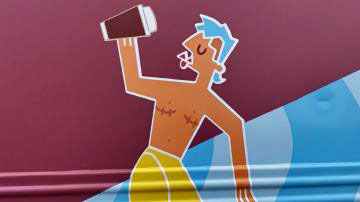Cutting off a girl’s healthy breasts is an act of mutilation. Putting a cartoon version of the scars on the side of a van, to advertise a coffee chain, is a new low even for a movement that long ago lost touch with reality. Post-operative pain, rigid scarring, a profound sense of loss: none of these feature in the image of a “trans man” approved by Costa Coffee, which appears to treat the visible effects of surgery as a desirable fashion accessory.
The coffee chain is evidently keener to be seen as a “trans ally” than to think about customers who are post-operative women. Around 15,000 female patients have a mastectomy in this country each year, after being diagnosed with breast cancer. They do it to save their own lives, not in pursuit of realising their “gender identity”. Imagine their feelings on seeing their experience trivialised in this way, as though an operation most women dread is something to be thrilled about.
Challenged over the image on the side of a Costa Express van, however, the company displayed the sensitivity of a robot. “We want everyone that interacts with us to experience the inclusive environment that we create, to encourage people to feel welcomed, free and unashamedly proud to be themselves,” a spokesman intoned. “The mural, in its entirety, showcases and celebrates inclusivity.”
It’s been clear for a while that “inclusivity”, when used in this way, actually excludes large numbers of people. Not just breast cancer survivors — they’re mostly women, so obviously they don’t count — but all of us who are horrified by an ideology that promotes lies to vulnerable young people. Human beings cannot change sex and a girl who agrees to a double mastectomy is still a girl, albeit one who faces a lifetime of negative consequences.
It is heartrending to listen to detransitioners, young women who believed that having their breasts amputated would relieve hatred of their own bodies, only to discover that it is another cause of anguish. Last week, an American woman called Chloe Cole, who is now 19 and suing her doctors for malpractice, described how she was prescribed puberty blockers and had a double mastectomy at the age of 15. She has to wear bandages on her chest because her body has rejected skin grafts following surgical removal of her breasts.
None of this is evident from Costa’s cartoon figure, balancing on a surfboard and cheerfully brandishing a cup of coffee. Costa is not the only brand to use a post-op image: parents took to social media last week to complain about mastectomy scars on a customised pair of Dr Martens shoes which the company gave away as a promotional stunt. The brands appear to have learned nothing from the experience of Bud Light, whose sales tanked after it partnered with a trans influencer who promotes wildly outdated ideas about femininity.
But the furious reaction to the cartoon, which has included a call to boycott Costa, suggests that the public is waking up to the damage done by gender ideology. No one is “born in the wrong body”, and promoting the idea that we can opt out of it has disastrous consequences, including needless surgery. Nothing could be more damning of gender extremism than the way it has duped hard-headed commercial companies into using scarred bodies as an advertising tool.











Join the discussion
Join like minded readers that support our journalism by becoming a paid subscriber
To join the discussion in the comments, become a paid subscriber.
Join like minded readers that support our journalism, read unlimited articles and enjoy other subscriber-only benefits.
Subscribe